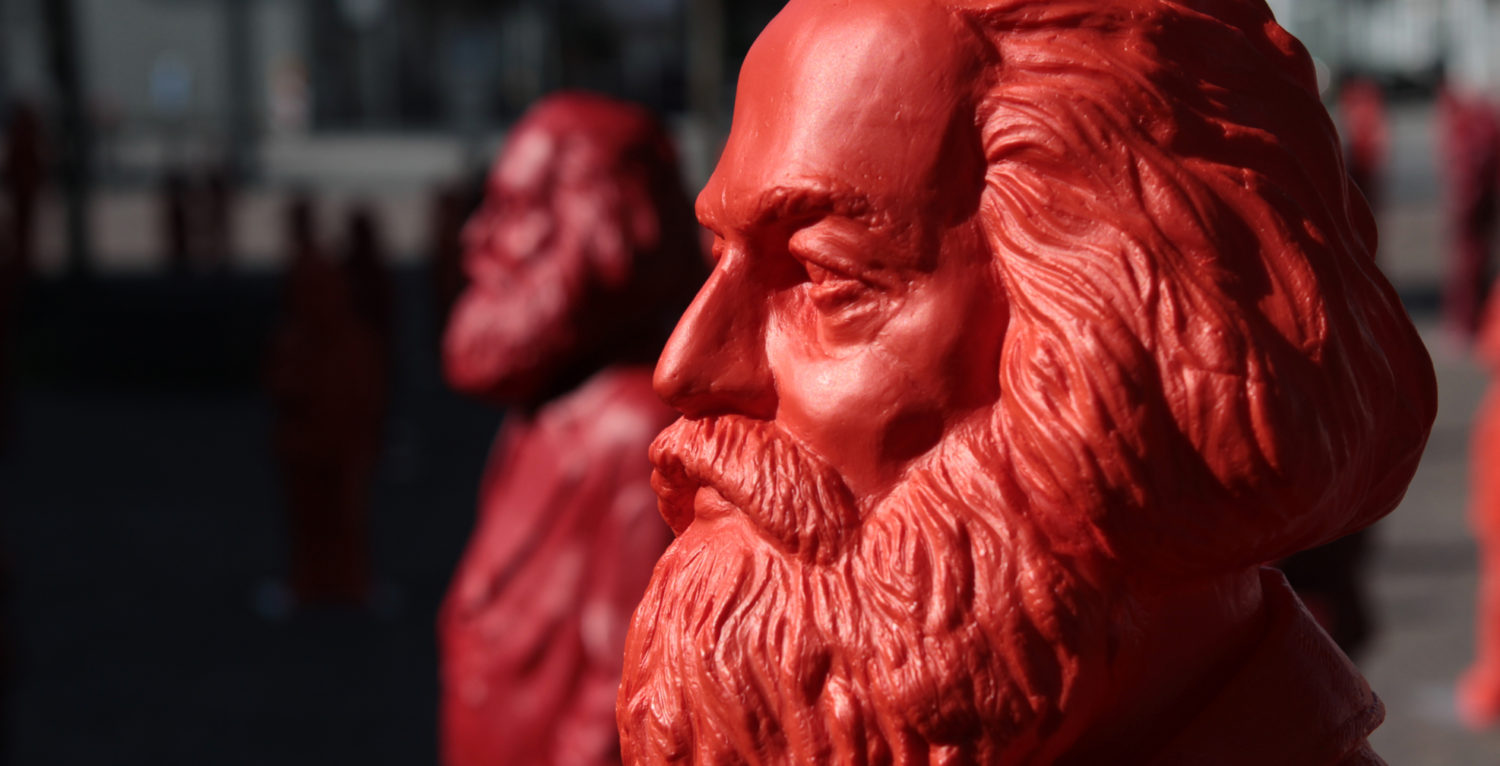Marxism revisited
Does Marx have a place in the modern Labour party? An alternative reading of his work could inform a fresh agenda for the left, suggest Jon Cruddas and Frederick Harry Pitts.
Labour MP Chris Leslie recently asserted that ‘Marxism has no place in the modern Labour party’. In terms of the party’s history and where it is today, this was way wide of the mark. It reflects a worrying misunderstanding of the party – not least amongst Labour MPs. For Marxism is resurgent within Labour today; it informs the most innovative thinking within the party. A new ecology of networks, publications and media platforms pays its dues to the great man. But stating the significance of Marx is the easy bit. Distilling the real meaning of this rehabilitation is more complex.
Labour today cannot be understood without an appreciation of how Marx has been received by a new generation of radicals. So we need to identify the Marxist resources the modern left draws upon. More generally, we might investigate Marx to discern a path through a number of the impasses on the contemporary left and tensions within what is emerging as ‘Corbynism’. There is a more general point here, as Leslie’s comment also misunderstands how past currents in the party – Blairism included – drew from Marx. Any visitor to a certain Islington home in the late 80s, for instance, could not have failed to notice the prominent display of Marx’s key texts on the Blair bookshelves. So, perhaps, a wider cross-section of the Labour party could benefit from a renewed appreciation of Marx.
A fashionable case in point
A good place to begin is with the most energetic part of the modern left. Undiagnosed by the mainstream of the Labour party, the political media and much of the academic world, a major intellectual renewal is currently underway across the left. It is fast becoming a new political movement and is best captured in influential articles and books discussing ‘accelerationism’, ‘postcapitalism’ and so-called ‘fully automated luxury communism’. Key thinkers and proselytizers include Paul Mason, Nick Srnicek and Aaron Bastani.
On one level, the origins of this new thinking lie in radical politics formed some 50 years ago. Autonomist Marxism has its origins in 1960s Italy and the workerist movement (‘operaismo’ in Italian), characterised by a muscular critique of the centralised, orthodox Italian left. It sought to build a politics autonomous from traditional forms of representative democracy, and emphasised direct action – in its early forms characterised by subversive struggle at work, often unmediated by traditional trade unions.
By the 70s operaismo had evolved into a ‘post-workerist’ or ‘post-operaist’ politics. This embraced a wider conception of anti-capitalist struggle beyond the immediate form of capitalist exploitation at work as a response to the automation of the Turin car plants. It also contained a corresponding redefinition of the working class triggered by technical change towards what was labelled the ‘social worker’ who labours in society at large.
Post-operaismo was popularised in the noughties by Hardt and Negri’s Empire – a work highly influential within the generational struggles behind the anti-globalisation movements of the time and, later, the militant millennials of post-crash occupations and campus agitation. Winding a route of increasing reconciliation with electoral compromise, these movements have mainlined post-operaismo into the intellectual undercurrents driving the Corbynist left.
Hardt and Negri proposed a break with the category of the working class in the wake of a crisis of work in capitalist society. This was encased in an enthusiasm for the new economy’s ‘multitude’ of ‘immaterial labourers’. Today, the most interesting quarters of the Labour left adapt this to fit new times. A narrative of left modernity and progress is built around a specific take on Marx’s value theory and the substitution of human labour – the working class – with technology. This, the theory goes, is something to be celebrated – indeed accelerated. The traditional class base of the left is replaced by a new urban, networked and educated youth – a multitude in all but name. A ‘postcapitalist’ epoch beckons as the capitalist relations of production – class structures, legal and political frameworks – cannot manage the current shifts in the forces of production – advances in machinery and information and communications technology. As the academic Matt Bolton has noted, this is a key Corbynist holdover from orthodox Marxism.
Whilst the most astute advocates of this position claim to avoid charges of technological determinism – that technological change will automatically accomplish social and political transformations – the implication remains that we must adapt our politics to match the march of the machines, rather than vice versa. To challenge or resist this risks dismissal as parochial, reactionary or Luddite. History is on the side of the new left political subject – unfortunately not in this case the working class – as change is both ‘immanent’ (concealed within the present) and imminent.
A hybrid combination of tech savvy utopianism and an oddly voguish transhumanism has emerged. One that pivots around a highly selective reading of Marx’s posthumously rediscovered but seemingly prophetic ‘Fragment on Machines’ and an embrace of a specific strain of continental philosophical abstraction.
The former, a mere few pages pulled from the Grundrisse (the notebooks for Capital), proposes that the ‘general intellect’ embodied in machines would come to replace direct human labour and create a crisis in capitalism’s capacity to capture value. This brings about an incipient communism arising from within the shell of a capitalist society rapidly passing into a new postcapitalist order. But crucially the salience of these slender few pages rests on an old-fashioned understanding of labour as the direct source of value that Marx himself would later go on to discard.
The second source of inspiration derives from a theoretical shift stemming from the failures of the workers and students revolts of 1968. This produced a dramatic and much-misunderstood reorientation within the continental post-Marxist philosophical Left. The superstars of postmodern cultural studies – Deleuze, Guattari, Lyotard – suggested an accelerationist approach to modern capitalism rather than a search to overcome it.
In short, what is on sale to young radicals today is the culmination of a series of political defeats and organisational rethinks, precise philosophical reorientations and specific textual readings all mixed up with a youthful tech-utopianism. This can appear bewildering, indeed impenetrable, without an understanding of the development of Marxism and the alternatives within it. So, even those opposed to any vestige of Marxism in the modern Labour party would be wise to understand where it comes from in order to know their enemy.
Understanding Marx: politics and meaning
To understand what is going on we should first free ourselves from two basic assumptions about Marx’s work that usually – wrongly – place it out-of-bounds for those interested in building a modern Labour party.
First, that there is a specific kind of political programme contained in Marx’s work. Instead we should focus on the particular resources of critique and analysis Marx’s work offers those seeking to understand the world in order to open up visions of the way that it could be. Contrary to the oft-repeated injunction not to interpret the world but to change it, the situation is precisely the reverse: the imperative today is to comprehend the world in order to change it.
Second, that Marx’s work amounts to a total, closed theoretical system which diagnoses the past, present and future of capitalist and postcapitalist society. Instead, Marx’s work is unfinished, fragmentary, largely posthumous and received in translation, and accordingly is both rife with misinterpretation and open to radically divergent readings and applications.
Marxism today
This twin capacity for misinterpretation and the unevenness of Marx’s output, provides a route into the assorted ‘Marxisms’ on offer within the modern Labour party and with it the contested terrain that is Corbynism. These take two basic forms.
On one hand, the older, more traditional Leninism of the long-dormant hard left. On the other, the younger, savvier postcapitalist left dealt with above. These competing Marxisms define the modern Labour left. In one sense, they could not be further apart in terms of assorted readings of the texts, democratic cultures, and competing identifications of the ‘base’ of the left, to name a few instances of divergence. But, the irony is that these generationally and politically distinct rival sides of the Corbynist coalition actually share a lot in common.
In both, unpublished and repackaged fragments of Marx’s thought – Bolton identifies the 1859 preface to The German Ideology, to which we can add the aforementioned Fragment – are used to support a crude determinism where the ‘superstructural’ relations of culture, morality, ideology, law and rights are conditioned by economic forces at the base. It translates into a cold utilitarianism; human beings are considered little more than carriers of these economic forces driving the laws of history, and politics shrinks from view.
In both the Leninist and postcapitalist kinds of Marxism, a conventional labour theory of value bestows all powers of creation in the hands of a traditional working class sure to inherit the wealth they are owed, as the forces of production reshape and explode the relations of production that constrain them. In reality, this economic theory of value owes more to David Ricardo than to their cherished Karl Marx. A politics based on the centralised control of the means of production flows directly from this.
Both Marxisms provide overly optimistic prognoses for the possibility of substantial change within the context of a crisis-ridden capitalism. Within each, a similar tale is told: the inevitable utopia accrues to those who produce a plenitude of value, the upwards arc of history flows from the technological unfolding of the forces of production, and a liberation focused on labour, whether from it or through it.
Marx’s recruitment to the cause of Corbynism seems seamless in the hands of these intellectual and political strands. But it can only be so on shaky theoretical and empirical foundations. Theoretically, where Marx’s theory wound up in the work he did publish – Capital ranking chief among it – it is typically overlooked in favour of relatively minor parts of his output, and with it any wider politics capable of confronting the issues around value, money and commodification that Marx captured so well therein.
Empirically, the concrete conditions that make possible the kinds of epochal shifts on which these visions hinge are simply not in evidence to the extent described. The effect of automation on unemployment, for example, is contested to say the least. It may be that current public and political hysteria about this is nothing more than a moral panic in which the postcapitalist left themselves have been swept up.
Politically, orienting a programme for the left around errant theoretical derivations from disputed repackagings of Marx’s work and empirical speculations of a future that may or may not come to pass is unwise and potentially dangerous. It involves promising the world on a plate when there may well be nothing there at all, and is a distraction from addressing problems in the present in the expectation that ‘the future’ will soon come to pass. It is one hell of a political bet based on a partial reading of the texts.
Both forms of technological determinism provide little role for actual struggle – for politics. The laws of history unfold and take us to the world of communism or postcapitalism. Of greater importance still is that both of these Marxist traditions reject humanism and ethics. And between them they offer only a limited insight into the true value of Marx for the contemporary Labour party.
Another Marx is possible
Is there an alternative way to read Marx that helps to rethink a contemporary left agenda for the Labour party? How can we use his work to drive a clear-sighted critique and analysis of the opportunities and challenges that confront us today rather than hit and hope on a historical horizon that may not exist?
Marx focused on how we exercise a human essence, defined by our capacity to transform the material world into a world of things useful to us. Yet he then sought to describe how material things escape the grasp of those that create them, as goods are alienated from those who produce them. His core insight was to identify how humans create structures of power – commodities, markets, states, laws, rights, technology – that then constrain and control us.
Marx’s analysis of commodity fetishism in Capital shows the extent to which the relationship of monetary exchange, through which we trade, changes the very things we produce into mysterious and compelling forms. Far from increasing human agency, the commodity form comes to control us. This idea informed many assorted critiques of consumerism throughout the twentieth century, but is much more than mere condescension about what people like to wear or eat.
The fetish concerns how the entire material and intellectual world we create resembles a double-edged sword whereby our labour realises our desires and designs but disappears into products and structures on which we then become dependent. This is as much the case with machinery as anything else. Though springing from our innovation, it exerts a debilitating impact on us in production, seldom liberating and more often driving our work towards ever-greater levels of drudgery. This approach implies a certain pessimistic perspective nowhere to be found in the optimistic prognoses of the contemporary postcapitalist left!
This reading of Marx also suggests that, contrary to economic determinism, not everything follows from the rational progression of the forces of production at the material base. Rather, the material world is co-constituted by superstructural relations of culture, identity and ideology that any left politics must address. For example, houses and jobs alone are not sufficient to beat the often-dangerous politics of belonging that today threaten liberal democracies.
This more complex take also impacts upon how we assess the prospects of progress. The hopeful portrayal of human liberation inherent in the leading contemporary strands of Marxism in the Labour party sees a teleological line charting a clear path to and through the future where none actually exists. Contrary to the theoretical and empirical optimism of all sides of the Marxist left in Labour – Blairism included! – things don’t only get better, they can get worse. Politics must remain aware of this contingency and the experience of defeat and be realistic in its objectives. This alternative reading of Marx also tells us that there is something essential about productive activity and struggle around it that makes an anti- or post-work politics insufficient to address human needs or wants, even if this sometimes makes life harder than it might otherwise be. Advocates of a world of automated worklessness supported by a universal basic income might bear this in mind.
Marx speaks from the past to warn today’s radicals that the escape from or glorification of work or labour cannot be the overriding focus of radical politics. We must instead consider how the work we do is conditioned in certain ways by the relations that structure it and the forms which its results assume. In other words, a politics of production must be accompanied by a politics of consumption and beyond.
Between the lines of Capital come other warnings for the Labour left today. The understanding of technology as a liberating force cannot be simply read-off from fragments of Marx’s wider project. This ignores – at a huge cost – what machinery means for workers engaged in production in capitalist societies where our human creative essence is subordinated to other ends.
This all brings us to a Marxism that, contrary to most applications, neither asks for the world on a plate nor sells believers an expectation of it. Rather, like Marx himself in his own life, it strikes compromises with the forces that constrain us in the here and now, which in many respects the contoured imaginaries of Marx in the contemporary Corbyn-led Labour party do not.


